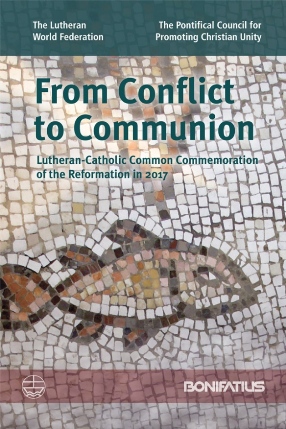In 2017, Catholic and Lutheran Christians will most fittingly look backon events that occurred 500 years earlier by putting the gospel of Jesus Christat the center. The gospel should be celebrated and communicated to the peo -ple of our time so that the world may believe that God gives Himself to humanbeings and calls us into communion with Himself and His church. Herein liesthe basis for our joy in our common faith.

Martin Luther’s struggle with God drove and defined his whole life. The question, How can I find a gracious God? plagued him constantly. He found
the gracious God in the gospel of Jesus Christ. “True theology and the knowledge of God are in the crucified Christ” (Heidelberg Disputation).
In 2017, Catholic and Lutheran Christians will most fittingly look back on events that occurred 500 years earlier by putting the gospel of Jesus Christ
at the center. The gospel should be celebrated and communicated to the people of our time so that the world may believe that God gives Himself to human beings and calls us into communion with Himself and His church. Herein lies the basis for our joy in our common faith.
To this joy also belongs a discerning, self-critical look at ourselves, not only in our history, but also today. We Christians have certainly not always
been faithful to the gospel; all too often we have conformed ourselves to the thought and behavioral patterns of the surrounding world. Repeatedly, we
have stood in the way of the good news of the mercy of God.
Both as individuals and as a community of believers, we all constantly require repentance and reform – encouraged and led by the Holy Spirit.
“When our Lord and Master, Jesus Christ”, said “He called for the entire life of believers to be one of repentance”. Thus reads the opening statement of Luther’s 95 Theses from 1517, which triggered the Reformation movement.
Although this thesis is anything but self-evident today, we Lutheran and Catholic Christians want to take it seriously by directing our critical glance first at ourselves and not at each other. We take as our guiding rule the doctrine of justification, which expresses the message of the gospel
and therefore “constantly serves to orient all the teaching and practice of our churches to Christ” (Joint Declaration on the Doctrine of Justification).
The true unity of the church can only exist as unity in the truth of the gospel of Jesus Christ. The fact that the struggle for this truth in the sixteenth
century led to the loss of unity in Western Christendom belongs to the dark pages of church history. In 2017, we must confess openly that we have been guilty before Christ of damaging the unity of the church. This commemorative year presents us with two challenges: the purification and healing of memories, and the restoration of Christian unity in accordance with the truth of the gospel of Jesus Christ (Eph 4:4–6).
The following text describes a way “from conflict to communion” – a way whose goal we have not yet reached. Nevertheless, the Lutheran–Roman
Catholic Commission on Unity has taken seriously the words of Pope John XXIII, “The things that unite us are greater than those that divide us”. We invite all Christians to study the report of our Commission both openmindedly and critically, and to come with us along the way to a deeper communion of all Christians.
Karlheinz Diez – Auxiliary Bishop of Fulda – on behalf of the Catholic co-chair
Eero Huovinen – Bishop Emeritus of Helsinki – Lutheran co-chair
https://www.lutheranworld.org/sites/default/files/From%20Conflict%20to%20Communion.pdf